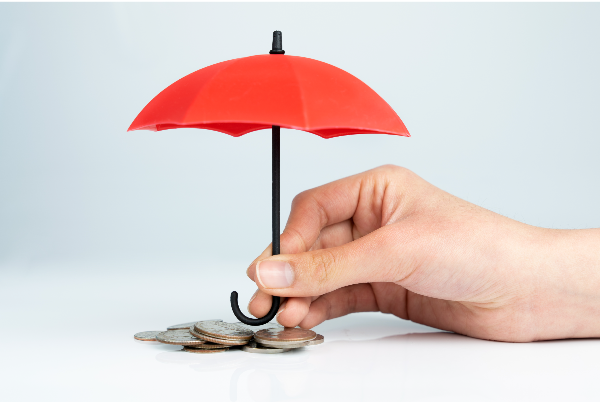How Much Cash Should I Have in my Portfolio?
You should not have any cash in your investment portfolio. Cash is a depreciating asset. Hold wealth preservation assets like bonds, precious metals, or safe ETFs during market sell-offs.
Why You Should Have no Cash in Your Portfolio
You should not have any cash in your portfolio because it is Federal Reserve policy to intentionally devalue the dollar. The United States Federal Reserve is responsible for controlling the value of the U.S. dollar. While consumers measure the price of goods in terms of the dollar, the Federal Reserve measures the value of the dollar versus a basket of staple consumer goods. Their goal is to not have prices rise too quickly, but to slowly rise, which in term means the value of the dollar is less.
This is called inflation. The Federal Reserve wants consumers to spend money. To achieve this, they allow small amounts of inflation instead of deflation. During deflation, currency can buy more goods today than it could yesterday. Consumers don't purchase goods with money during delation.
For example, why buy a cheese burger today for $5 dollars when you can buy the same cheese burger tomorrow for $4 dollars? Consumers will delay spending if they believe money will go in value. Inflation avoids this problem by having money slowly lose its value.
Assets to Hold During Market Volatility
Hold Bonds
Bonds give their investors interest payments, which may be higher than the rate of inflation. Hence, buying bonds will protect your assets from eroding due to inflation. When you buy bonds, you're buying a debt vehicle. You are letting organizations borrow money from you. Typical bonds are U.S. government bonds, corporate bonds, and municipal bonds.
Hold Precious Metals
Precious metals typically increase in value when the stock market is in a sell-off. Precious metals include gold and silver. Other commodities like Titanium and Uranium can be used as well.
Hold Safe ETFs
You can purchase Exchange Traded Funds (ETFs) that are a basket of stocks and assets representing a certain investment theme. For example, instead of buying bonds, you can buy a bond ETF like BND and TLT. One reason to do this is to avoid the learning curve associated with buying a bond ladder as buying bonds is slightly more complex than buying a stock or ETF.
Buy Utility Stocks
Utilities will typical fall less than the overall market during a sell-off because Utilities historically have consistent earnings, revenue and dividends. A utility may even appreciate in value during volatile times as investors flock to safe haven investments. Buying a utility stock typically provides dividends for investors.
Guidance for Beginning Investors
For new investors, check out our new investor tips guide as well as our ultimate guide for beginning investors. Here are some tips for new investors:
- Buy stock in companies that you know
- Start investing now, even if it's in fractional shares
- Buy stocks when everyone else is selling
- Dividends are typically quarterly payouts to investors for owning stock. Get some dividend stocks to round out your portfolio and manage your risk.




How Much Cash Should I Have in my Portfolio?
You should not have any cash in your investment portfolio. Cash is a depreciating asset. Hold wealth preservation assets like bonds, precious metals, or safe ETFs during market sell-offs.
Why You Should Have no Cash in Your Portfolio
You should not have any cash in your portfolio because it is Federal Reserve policy to intentionally devalue the dollar. The United States Federal Reserve is responsible for controlling the value of the U.S. dollar. While consumers measure the price of goods in terms of the dollar, the Federal Reserve measures the value of the dollar versus a basket of staple consumer goods. Their goal is to not have prices rise too quickly, but to slowly rise, which in term means the value of the dollar is less.
This is called inflation. The Federal Reserve wants consumers to spend money. To achieve this, they allow small amounts of inflation instead of deflation. During deflation, currency can buy more goods today than it could yesterday. Consumers don't purchase goods with money during delation.
For example, why buy a cheese burger today for $5 dollars when you can buy the same cheese burger tomorrow for $4 dollars? Consumers will delay spending if they believe money will go in value. Inflation avoids this problem by having money slowly lose its value.
Assets to Hold During Market Volatility
Hold Bonds
Bonds give their investors interest payments, which may be higher than the rate of inflation. Hence, buying bonds will protect your assets from eroding due to inflation. When you buy bonds, you're buying a debt vehicle. You are letting organizations borrow money from you. Typical bonds are U.S. government bonds, corporate bonds, and municipal bonds.
Hold Precious Metals
Precious metals typically increase in value when the stock market is in a sell-off. Precious metals include gold and silver. Other commodities like Titanium and Uranium can be used as well.
Hold Safe ETFs
You can purchase Exchange Traded Funds (ETFs) that are a basket of stocks and assets representing a certain investment theme. For example, instead of buying bonds, you can buy a bond ETF like BND and TLT. One reason to do this is to avoid the learning curve associated with buying a bond ladder as buying bonds is slightly more complex than buying a stock or ETF.
Buy Utility Stocks
Utilities will typical fall less than the overall market during a sell-off because Utilities historically have consistent earnings, revenue and dividends. A utility may even appreciate in value during volatile times as investors flock to safe haven investments. Buying a utility stock typically provides dividends for investors.
Guidance for Beginning Investors
For new investors, check out our new investor tips guide as well as our ultimate guide for beginning investors. Here are some tips for new investors: